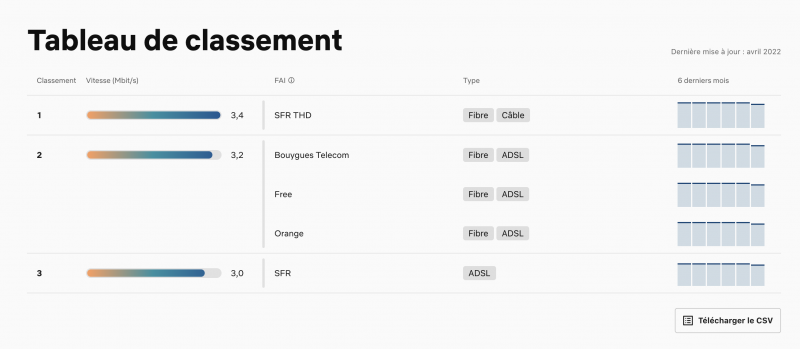
Like every month, Netflix publishes its ISP Speed Index, which measures average streaming speed by country and ISP. After several months of stabilization, productivity fell in April.
Redesigned at the beginning of 2021, Netflix’s ISP report allows SVOD performance to be compared with each operator during peak times. It is not a general performance measure that includes other services/data that may be circulating on the respective ISP’s network.
In France, all French operators suffered a loss of 0.2 Mbit/s during the month of April, Netflix revealed. With a speed of 3.4 Mbit / s, the SFR THD remains the leader. In the back, Orange, Bouygues Telecom and Free share the second place with speeds of 3.2 Mbit / s. In last place, ADSL’s SFR records speeds of 3 Mbit/s. Once again, the gaps remain narrow between the four players.
So the average French speed is 3.2 Mbit/s, as is Argentina, Austria, Bolivia, Brazil, Chile, Ecuador, France, Greece, India, Indonesia, Italy, Japan, Mexico, Paraguay, Philippines, Poland, Taiwan, Trinidad and Tobago, Turkey, Uruguay, and Vietnam.
The best overall performance (3.4 Mbit/s) was recorded particularly in Germany, Australia, Belgium, Canada, South Korea, Denmark, Spain, United States, Finland, Hong Kong, Hungary, Ireland, Iceland, Israel, Luxembourg, Malaysia, Norway, New Zealand, Panama, Netherlands, Portugal, Romania, United Kingdom, Singapore, Sweden, Switzerland and Thailand.
Netflix methodology
To calculate your ISP’s performance, Netflix follows two steps. In the first, SVoD juggernaut splits “Peak-time sessions into 0.5 megabits-per-second (Mbps) segments based on the maximum possible throughput, then compute time-weighted throughput achieved for all sessions in each segment.” This is sufficient to measure the difference between the effective throughput of combined sessions and their maximum potential throughput. Next comes the calculation of the total time distribution of these parts and the normalization of each ISP.
This performance indicator covers home broadband networks. “As such, we are careful to exclude live streaming from cellular networks based on the provided CIDR/IP address ranges or when devices report being connected directly to Netflix using a cellular antenna.”, select Netflix. This includes operators who consistently watch more than 1% of the hours of Netflix content in the country. Finally, prime time is defined as 3 hours of maximum consumption of Netflix programs per day per ISP. One day it might be 7-9pm, another 6pm, and then 9-10pm.

“Total creator. Evil zombie fan. Food evangelist. Alcohol practitioner. Web aficionado. Passionate beer advocate.”


